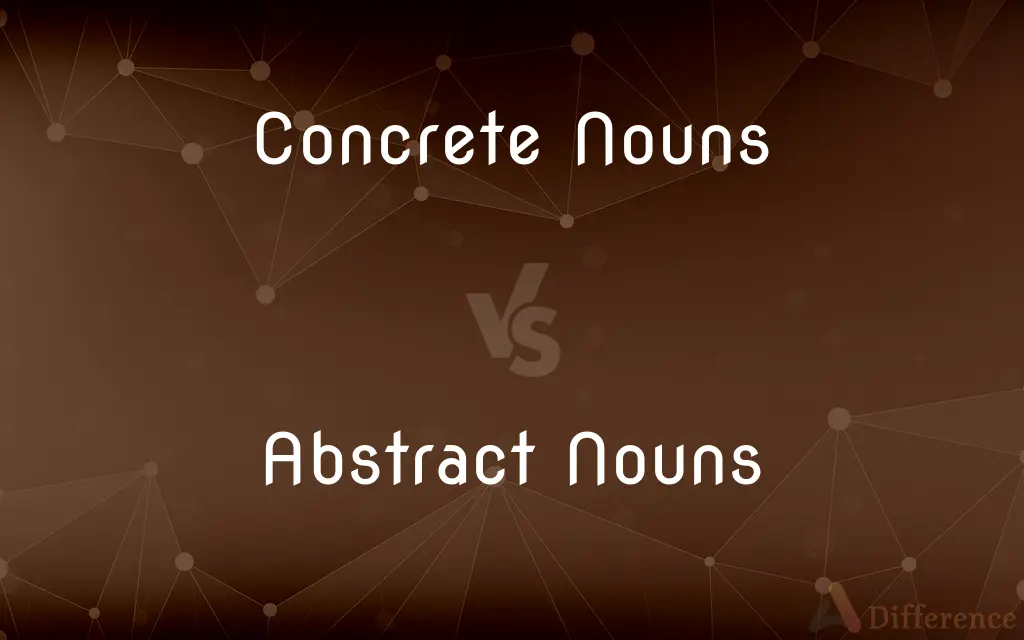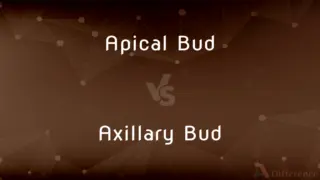Concrete Nouns vs. Abstract Nouns — What's the Difference?
By Tayyaba Rehman — Published on January 1, 2024
Concrete nouns are tangible and can be experienced with the senses, while abstract nouns represent intangible concepts or ideas.

Difference Between Concrete Nouns and Abstract Nouns
Table of Contents
ADVERTISEMENT
Key Differences
Concrete nouns refer to physical objects or things that can be seen, touched, heard, smelled, or tasted. They are tangible and observable in the real world. For instance, a chair, a dog, or a mountain are all concrete nouns because they have a physical presence.
In contrast, abstract nouns represent ideas, qualities, or states that cannot be perceived with the senses. They are intangible and often refer to emotions, concepts, or qualities. Examples include love, freedom, or happiness. These nouns do not have a physical form but are just as important in language to express complex ideas and emotions.
While concrete nouns ground language in the physical world, abstract nouns allow for the expression of more nuanced and subjective experiences. The distinction is crucial in language as it helps in conveying different types of information and ideas.
Both types of nouns are essential in language. Concrete nouns help in clear communication about the physical world, while abstract nouns are vital for discussing ideas, emotions, and concepts that do not have a physical form but are significant to human experience.
Comparison Chart
Tangibility
Tangible and physical.
Intangible and conceptual.
ADVERTISEMENT
Sensory Experience
Can be experienced with senses.
Cannot be perceived with senses.
Examples
Chair, apple, bird.
Love, freedom, justice.
Usage in Language
Describe physical entities.
Express ideas, emotions, qualities.
Role in Communication
Provide clarity and specificity.
Convey complex, subjective experiences.
Compare with Definitions
Concrete Nouns
Audible Item
Something you can hear. The bell rang loudly.
Abstract Nouns
Emotion
A feeling. Happiness filled the room.
Concrete Nouns
Physical Object
Something you can touch. The table is made of wood.
Abstract Nouns
Belief
A conviction or principle. Freedom is a fundamental right.
Concrete Nouns
Observable Entity
Something you can see. The eagle soared high.
Abstract Nouns
Idea
A concept or thought. Justice should be impartial.
Concrete Nouns
Tangible Thing
Something with physical presence. The fragrance of flowers filled the air.
Abstract Nouns
Quality
A characteristic. Her kindness was well-known.
Concrete Nouns
Material Item
Something with substance. She bit into the crisp apple.
Abstract Nouns
State
A condition. The peace negotiations were successful.
Common Curiosities
What is a Concrete Noun?
A noun representing a tangible object.
What is an Abstract Noun?
A noun representing an intangible concept.
Give an example of a Concrete Noun.
"Tree" is a concrete noun.
Are feelings Concrete or Abstract Nouns?
They are abstract nouns.
Are Abstract Nouns physical?
No, they represent ideas or qualities.
Can Concrete Nouns be touched?
Yes, they are physical.
Can Concrete Nouns be seen?
Yes, they are observable.
Is "Apple" a Concrete or Abstract Noun?
"Apple" is a concrete noun.
Give an example of an Abstract Noun.
"Love" is an abstract noun.
Can Abstract Nouns be emotions?
Yes, they often represent emotions.
Can Abstract Nouns be smelled?
No, they are intangible.
Do Concrete Nouns always refer to objects?
Yes, they refer to tangible things.
Are Concrete Nouns important for clear communication?
Yes, they provide specificity.
Why are Abstract Nouns important in language?
They convey complex ideas and emotions.
Is "Justice" a Concrete or Abstract Noun?
"Justice" is an abstract noun.
Share Your Discovery

Previous Comparison
Apical Bud vs. Axillary Bud
Next Comparison
Styrofoam vs. ThermocolAuthor Spotlight
Written by
Tayyaba RehmanTayyaba Rehman is a distinguished writer, currently serving as a primary contributor to askdifference.com. As a researcher in semantics and etymology, Tayyaba's passion for the complexity of languages and their distinctions has found a perfect home on the platform. Tayyaba delves into the intricacies of language, distinguishing between commonly confused words and phrases, thereby providing clarity for readers worldwide.
















































